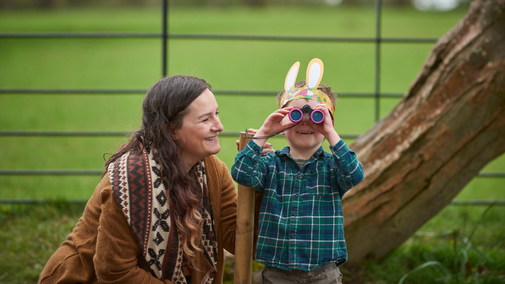
Discover more at Attingham
Find out when Attingham Park is open, how to get here, the things to see and do and more.

Step out on a walk in Attingham's garden and discover a restored Walled Garden, two-acre orchard and historic pleasure grounds teeming with wildlife. Be inspired to grow your own seasonal fruit and veg by visiting the Georgian Kitchen Garden.
Blossom at Attingham starts to appear in the spring from late February onwards. The first blossom is usually on the apricot trees and is soon followed by the blackthorn.
When visiting Attingham, the best place to see blossom is in the Walled Garden and the Orchard, where there are over 300 fruit trees, which blossom at different times. These include apples, pears, cherries, damsons, apricots, peaches, nectarines, gages, plums, medlars and quince.
Soak up the scents, sights and sounds of Attingham's restored Walled Garden. Originally created in the 1780s, the team have been bringing this important part of the Attingham Estate back to life and production. After falling into disrepair, and having different uses in the 20th century, this Georgian kitchen garden is both beautiful and bountiful today.
Fresh produce grown in the Walled Garden is used in seasonal dishes on the menu in the café. Depending on the harvest, surplus crops are sometimes available to buy in the Stables Shop.

Attingham's two-acre orchard reflects the size of the wider Attingham Estate. The orchard and walled garden were the most intensely productive areas of the Georgian estate. Probably built in the 1780s, at the same time as the mansion, it’s located out of sight, away from the rivers Severn and Tern that meander across the estate.
Georgian gardeners carefully cultivated different varieties of apples that ripened throughout the year, extending the natural growing season with early and later crops of eating and cooking apples.
This is still the case today. The first of the apples to be picked are the Red Joanetting apples in July and the last are the Sturmer Pippins in November to be supplied to Attingham's Carriage House Café and Stables Shop for most of the year. The Georgians would have been without home-grown apples only during May and June.
The orchard is a haven for wildlife and insects. Bees feed on the spring apple blossom and birds, such as blue tits and blackbirds, nest in the trees in holes left by falling branches. Wasps are welcome in the organic orchard as they play an important role in keeping aphids down by feeding on them.

Find out when Attingham Park is open, how to get here, the things to see and do and more.

Uncover a changing story of love and neglect, of changing fortunes, revival and rediscovery inside the Regency Mansion at Attingham.

Discover what family-friendly activities are on offer at Attingham Park this summer, from the Field of Play to parkland trails and things to see in the house.

Discover our gardeners’ top tips so you can make the most of your garden, plot or window box.

From masterpieces of Victorian garden design to open parklands, there are plenty of beautiful leafy places to explore in Shropshire and Staffordshire.